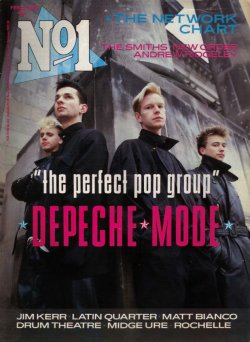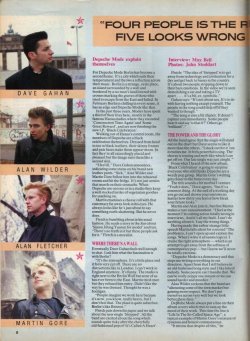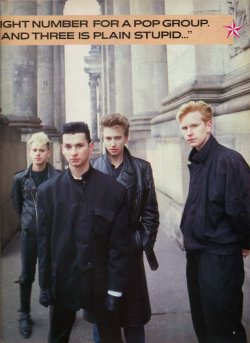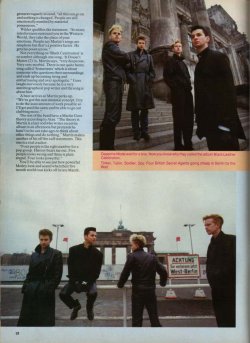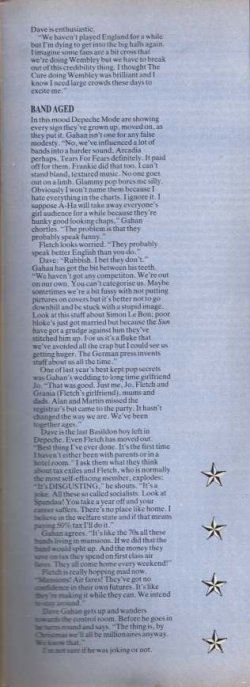Four People Is The Right Number For A Pop Group. Five Looks Wrong And Three Is Plain Stupid ...
[No. 1, 22nd February 1986. Words: Max Bell. Pictures: John Stoddart.]
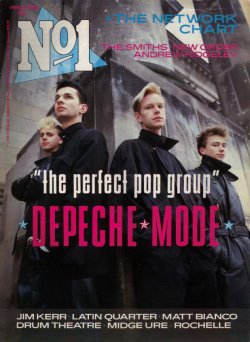
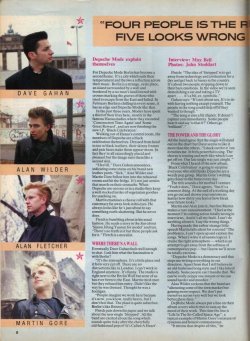
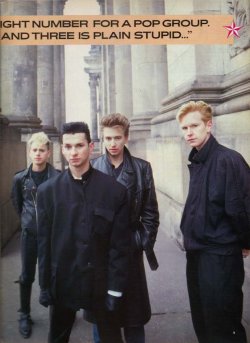
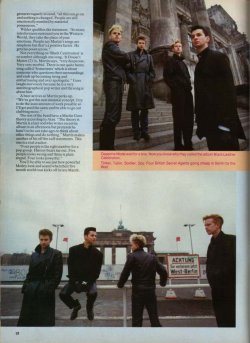
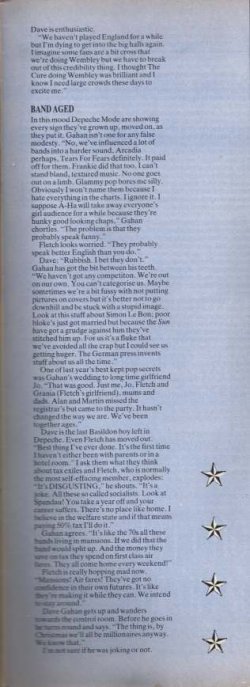
Depeche Mode explain themselves
For Depeche Mode Berlin has become a second home. It’s a city which suits their temperament and throws a reflection across their music. Berlin is a strange, eerie place, an island surrounded by a wall and bordered by a no-man’s land littered with crosses marking the graves of those who tried to escape from the East and failed. In February Berlin is chilling in every sense, it has an edge and Depeche Mode like that.
In the past three years, Modey have spent a third of their lives here, mostly in the famous Hansa Studios where they recorded “Construction Time Again” and “Some Great Reward”, and are now finishing the new LP, “Black Celebration”.
Walking out of Hansa’s control room, the members of Depeche Mode are a black celebration themselves. Dressed from head to toe in black leather, their skinny frames and pale faces make them appear mean. In fact they’re all exceedingly placid and pleasant but the image suits them like a second skin.
“I feel ill,” Dave Gahan announces, indicating some stains on his brand new leather pants. “Sick.” Alan Wilder and Martin Gore follow him into the rehearsal rooms and hit the fridge. It’s not just armies that march on their stomachs. When Depeche are on tour or in a studio they keep a well stocked larder of vegetarian goodies for snacking on. [1]
Martin examines a cheese roll with that customary far away look in his eyes. He always looks like he’s just about to say something earth-shattering. But he never does.
Fletch is bumbling about in his usual fashion. He reads a story in the Sun about “Simon Jilting Yasmin for model” and tuts. “There’s no truth in it but these people ask for it.” Fletch is a moralist.
WHERE THERE’S A WALL
Eventually Dave Gahan feels well enough to chat. I ask him what the fascination is with Berlin?
“It’s the atmosphere. It’s a little place and it feels very cut off. There are no distractions like in London. I can’t work in England anymore. It’s funny. The studio is right next to the Berlin Wall but none of us has ever been to the East. Martin tried once but they refused him entry. Didn’t like the way he was dressed. Thought he was a hooligan.
“People imagine we work here because it’s wow, you know, really heavy, but I don’t feel that. The place is quite suburban. Berlin’s like Brixton.”
Fletch puts down his paper and we talk about the new single “Stripped”. All the band are excited about the song which sounds quite risky after the cheerfully old-fashioned pop of “It’s Called A Heart”.
Fletch: “The idea of “Stripped” is to get away from technology and civilisation for a day and get back to basics in the country. It’s about two people stripping down to their bare emotions. In the video we’re seen demolishing a car and taking a TV apart… it’s a bit, er, symbolic.”
Gahan says: “It’s not about sex. It’s to do with having nothing except yourself. The people in the song could strip off if they wanted to though.”
“The song is also a bit chancy. It doesn’t capture you immediately. Some people hear it and say “Is that it?” Others go “Brilliant!”.”
THE POWER AND THE GLORY
All the band agree that the single will stand out on the chart but Dave seems to like it more than the others. “I stuck out for it ’cos it excites me. It feels powerful to sing. The chorus is rousing and mob-like which I can get off on. Our last single was just alright.”
From what I heard of the new album, “Black Celebration” is going to surprise everyone who still thinks Depeche are a weedy pop group. Martin Gore’s writing gets closer to the bone every day.
The title sounds a bit morbid I venture. “Yeah it does,” Dave agrees, “but it’s a common thing. At the end of a working day you go out and drown your sorrows no matter how shitty you feel or how bleak your future looks.”
Martin and Alan join in, but first Martin makes a rare announcement. “I feel at the moment I’m coming across totally wrong in interviews. And it’s all my fault. I can’t do anything about it. I say the wrong things.”
Having made this rather strange little speech Martin falls silent for a second. “The problem is, I can’t open up and explain the songs. When I write it all seems logical. I create the right atmosphere – which is an attempt to get away from the softness of contemporary pop – but I know we’ll never be totally extreme.
“Depeche Mode is a democracy and that stops me writing everything in one direction. Apart from that I still believe in an old-fashioned song style and I like lots of melody. Some people can’t handle that. We can be really poppy one minute or we can sound harder and moodier.”
Alan Wilder reckons that the band are “alienating some of the teen market but gaining more respect. We don’t put ourselves across very well but we look better these days.”
Depeche Mode always put a line on their album covers which tries to sum up the mood of their work. This time the line is “Life In The So-Called Space Age”, a typical example of Martin Gore’s mixture of cynicism and commonsense.
“It means that despite all this,” he gestures vaguely around, “all this can go on and nothing is changed. People are still emotionally numbed by material possessions.”
Wilder qualifies the statement. “So many interferences surround you in the Western World, they take the place of your emotions. People say Martin’s songs are simplistic but that’s a positive factor. He gets his point across.”
Not everything on “Black Celebration” is so sombre although one song, “It Doesn’t Matter (2)” is, Martin says, “very desperate. Very very morbid. There is one quite funny song called “Sometimes” which is about someone who questions their surroundings and ends up becoming tiring and over apologetic.” Gore laughs nervously because he is a very autobiographical pop writer and the song is about him.
A beer arrives so Martin perks up. “We’ve got this new minimal concept. I try to do the least amount of work possible so I’ll get paid the same and be able to go out clubbing more.”
The rest of the band have a Martin Gore theory according to Alan. “The theory is Martin is a lazy sod who writes an entire album in an afternoon but pretends he hasn’t so he can take ages to think about other things and do nothing.” Martin makes another of his off the cuff statements. This one is a real cracker.
“Four people is the right number for a pop group. History bears me out. Five people looks wrong and three is plain stupid. Four looks powerful.”
You’ll be able to see just how powerful Modey look and sound when their five month world tour kicks off in late March.
Dave is enthusiastic.
“We haven’t played England for a while but I’m dying to get into the big halls again. I imagine some fans are a bit cross that we’re doing Wembley but we have to break out of this credibility thing. I thought The Cure doing Wembley was brilliant and I know I need large crowds these days to excite me.”
[No. 1, 22nd February 1986. Words: Max Bell. Pictures: John Stoddart.]
The band are interviewed in West Berlin, discussing the atmosphere of the city and the resulting weightier tone of the forthcoming Black Celebration album. Fletch is putting the world to rights, Dave is fired up and ripe for world conquest, and Martin has, frankly, gone off on one, which leaves Alan to provide all the sensible answers.
" Depeche Mode is a democracy and that stops me writing everything in one direction. Apart from that I still believe in an old-fashioned song style and I like lots of melody. Some people can’t handle that. We can be really poppy one minute or we can sound harder and moodier. "





Depeche Mode explain themselves
For Depeche Mode Berlin has become a second home. It’s a city which suits their temperament and throws a reflection across their music. Berlin is a strange, eerie place, an island surrounded by a wall and bordered by a no-man’s land littered with crosses marking the graves of those who tried to escape from the East and failed. In February Berlin is chilling in every sense, it has an edge and Depeche Mode like that.
In the past three years, Modey have spent a third of their lives here, mostly in the famous Hansa Studios where they recorded “Construction Time Again” and “Some Great Reward”, and are now finishing the new LP, “Black Celebration”.
Walking out of Hansa’s control room, the members of Depeche Mode are a black celebration themselves. Dressed from head to toe in black leather, their skinny frames and pale faces make them appear mean. In fact they’re all exceedingly placid and pleasant but the image suits them like a second skin.
“I feel ill,” Dave Gahan announces, indicating some stains on his brand new leather pants. “Sick.” Alan Wilder and Martin Gore follow him into the rehearsal rooms and hit the fridge. It’s not just armies that march on their stomachs. When Depeche are on tour or in a studio they keep a well stocked larder of vegetarian goodies for snacking on. [1]
Martin examines a cheese roll with that customary far away look in his eyes. He always looks like he’s just about to say something earth-shattering. But he never does.
Fletch is bumbling about in his usual fashion. He reads a story in the Sun about “Simon Jilting Yasmin for model” and tuts. “There’s no truth in it but these people ask for it.” Fletch is a moralist.
WHERE THERE’S A WALL
Eventually Dave Gahan feels well enough to chat. I ask him what the fascination is with Berlin?
“It’s the atmosphere. It’s a little place and it feels very cut off. There are no distractions like in London. I can’t work in England anymore. It’s funny. The studio is right next to the Berlin Wall but none of us has ever been to the East. Martin tried once but they refused him entry. Didn’t like the way he was dressed. Thought he was a hooligan.
“People imagine we work here because it’s wow, you know, really heavy, but I don’t feel that. The place is quite suburban. Berlin’s like Brixton.”
Fletch puts down his paper and we talk about the new single “Stripped”. All the band are excited about the song which sounds quite risky after the cheerfully old-fashioned pop of “It’s Called A Heart”.
Fletch: “The idea of “Stripped” is to get away from technology and civilisation for a day and get back to basics in the country. It’s about two people stripping down to their bare emotions. In the video we’re seen demolishing a car and taking a TV apart… it’s a bit, er, symbolic.”
Gahan says: “It’s not about sex. It’s to do with having nothing except yourself. The people in the song could strip off if they wanted to though.”
“The song is also a bit chancy. It doesn’t capture you immediately. Some people hear it and say “Is that it?” Others go “Brilliant!”.”
THE POWER AND THE GLORY
All the band agree that the single will stand out on the chart but Dave seems to like it more than the others. “I stuck out for it ’cos it excites me. It feels powerful to sing. The chorus is rousing and mob-like which I can get off on. Our last single was just alright.”
From what I heard of the new album, “Black Celebration” is going to surprise everyone who still thinks Depeche are a weedy pop group. Martin Gore’s writing gets closer to the bone every day.
The title sounds a bit morbid I venture. “Yeah it does,” Dave agrees, “but it’s a common thing. At the end of a working day you go out and drown your sorrows no matter how shitty you feel or how bleak your future looks.”
Martin and Alan join in, but first Martin makes a rare announcement. “I feel at the moment I’m coming across totally wrong in interviews. And it’s all my fault. I can’t do anything about it. I say the wrong things.”
Having made this rather strange little speech Martin falls silent for a second. “The problem is, I can’t open up and explain the songs. When I write it all seems logical. I create the right atmosphere – which is an attempt to get away from the softness of contemporary pop – but I know we’ll never be totally extreme.
“Depeche Mode is a democracy and that stops me writing everything in one direction. Apart from that I still believe in an old-fashioned song style and I like lots of melody. Some people can’t handle that. We can be really poppy one minute or we can sound harder and moodier.”
Alan Wilder reckons that the band are “alienating some of the teen market but gaining more respect. We don’t put ourselves across very well but we look better these days.”
Depeche Mode always put a line on their album covers which tries to sum up the mood of their work. This time the line is “Life In The So-Called Space Age”, a typical example of Martin Gore’s mixture of cynicism and commonsense.
“It means that despite all this,” he gestures vaguely around, “all this can go on and nothing is changed. People are still emotionally numbed by material possessions.”
Wilder qualifies the statement. “So many interferences surround you in the Western World, they take the place of your emotions. People say Martin’s songs are simplistic but that’s a positive factor. He gets his point across.”
Not everything on “Black Celebration” is so sombre although one song, “It Doesn’t Matter (2)” is, Martin says, “very desperate. Very very morbid. There is one quite funny song called “Sometimes” which is about someone who questions their surroundings and ends up becoming tiring and over apologetic.” Gore laughs nervously because he is a very autobiographical pop writer and the song is about him.
A beer arrives so Martin perks up. “We’ve got this new minimal concept. I try to do the least amount of work possible so I’ll get paid the same and be able to go out clubbing more.”
The rest of the band have a Martin Gore theory according to Alan. “The theory is Martin is a lazy sod who writes an entire album in an afternoon but pretends he hasn’t so he can take ages to think about other things and do nothing.” Martin makes another of his off the cuff statements. This one is a real cracker.
“Four people is the right number for a pop group. History bears me out. Five people looks wrong and three is plain stupid. Four looks powerful.”
You’ll be able to see just how powerful Modey look and sound when their five month world tour kicks off in late March.
Dave is enthusiastic.
“We haven’t played England for a while but I’m dying to get into the big halls again. I imagine some fans are a bit cross that we’re doing Wembley but we have to break out of this credibility thing. I thought The Cure doing Wembley was brilliant and I know I need large crowds these days to excite me.”
Last edited:

